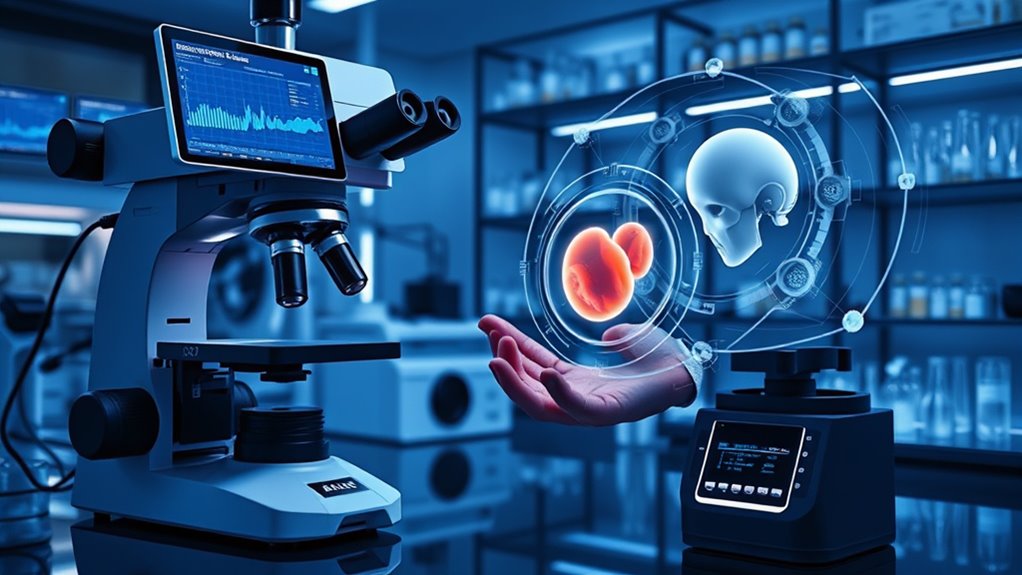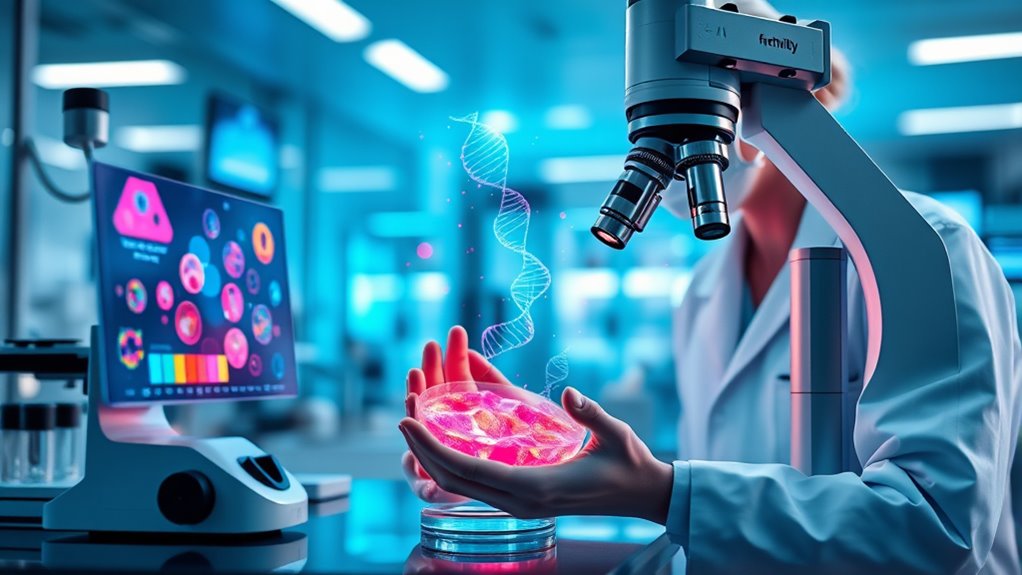AI in predictive fertility treatments helps you get personalized IVF plans, optimizing medication dosages and timing for egg retrieval. It analyzes your unique data—age, health, hormone levels—to forecast your chances of success more accurately. AI also improves embryo selection and monitors development, increasing the likelihood of conception. By providing clear insights and tailored options, AI can make your fertility journey more efficient and promising. Keep exploring to discover how these innovations can support your goals.
Key Takeaways
- AI personalizes IVF protocols by analyzing individual patient data to optimize treatment plans and medication dosages.
- Predictive models assess hormone levels and embryo development to determine optimal timing for egg retrieval and transfer.
- AI evaluates gamete quality through advanced image analysis, improving accuracy in sperm and oocyte assessment.
- Embryo monitoring systems use AI to identify high-potential embryos, increasing success rates of implantation.
- Decision support tools leverage AI analytics to forecast IVF outcomes and guide personalized treatment options.

Have you ever wondered how artificial intelligence is transforming fertility treatments? AI is revolutionizing the way clinics approach IVF by providing personalized, data-driven insights that improve outcomes. When you undergo fertility treatments, AI tailors your IVF plans based on your unique data—like age, ancestry, weight, and existing health conditions—allowing clinicians to make better-informed decisions. This personalization helps enhance treatment protocols, reducing the number of cycles needed and increasing the chances of success. For example, machine learning models analyze your specific information to determine the best follicle-stimulating hormone (FSH) dosing, sometimes lowering medication use by up to 20%. This not only boosts effectiveness but also cuts down costs, making treatments more accessible. Additionally, tuning methods, similar to those used in automotive performance upgrades, can be applied to optimize stimulation protocols for individual patients, further improving outcomes. These advanced techniques are part of a broader trend toward personalized medicine, which tailors healthcare to each individual’s unique genetic and physiological profile.
AI customizes IVF plans, reducing cycles and costs while improving success rates through personalized data analysis.
Timing plays a critical role in IVF success. AI assists clinicians in pinpointing the ideal moment for egg retrieval, improving fertilization chances. By analyzing various factors, including hormone levels and embryo development trends, AI helps schedule procedures at the most promising times. This precision means fewer unnecessary procedures and a higher likelihood of successful conception. Moreover, AI’s ability to customize drug selection and dosing protocols leads to fewer treatment cycles, saving you time, money, and emotional stress.
AI also excels at evaluating gamete quality. Through advanced image analysis algorithms, AI enhances the assessment of sperm and oocyte morphology, providing more accurate evaluations than traditional methods. For instance, sperm motility evaluations performed by AI are about 15% more precise than human assessments, reducing variability and increasing reliability. Automated systems can sort and select sperm to maximize fertilization potential while minimizing contamination during IVF procedures. Standardizing gamete quality assessment across clinics ensures consistent results, ultimately improving fertilization rates and embryo quality.
Embryo selection and monitoring benefit greatly from AI. These models analyze developmental stages and embryo morphology to identify those with the highest potential for implantation. By integrating hormonal and embryological data, AI can even help determine the best timing for embryo transfer. Automated image analysis tools assist embryologists in real-time, reducing subjective bias and enhancing accuracy. This leads to better embryo grading and, consequently, higher pregnancy success rates.
AI-powered decision support tools like CHLOE™ further improve clinical confidence by providing transparent, explainable insights from laboratory and patient data. They help clinicians and patients understand prognosis and treatment options through clear visualizations, fostering trust. Additionally, AI optimizes medication protocols by predicting individual responses, reducing medication use, and minimizing risks associated with over- or under-stimulation. This personalized approach lowers treatment costs and enhances safety.
Ultimately, AI’s predictive analytics enable clinics to forecast IVF success rates more precisely. By continuously analyzing vast datasets, AI models identify patterns and factors influencing outcomes, guiding patients toward the most promising treatment paths. This integration of AI into fertility care ensures more accurate, efficient, and personalized treatments, giving you a better shot at building your family.
Frequently Asked Questions
How Accurate Are AI Predictions for Individual Fertility Outcomes?
You’re asking how accurate AI predictions are for individual fertility outcomes. AI models typically achieve around 78% accuracy, often outperforming embryologists, with some neural networks reaching up to 90%. They excel at embryo grading, with about 97% accuracy, and can help develop personalized treatment plans. While promising, remember that AI still needs thorough validation and high-quality data to guarantee reliability in real-world clinical settings.
What Are the Ethical Concerns Surrounding AI in Fertility Treatments?
You should consider that AI in fertility treatments raises ethical concerns like data privacy, informed consent, and patient autonomy. It can influence your treatment choices with data-driven suggestions, possibly affecting your personal decision-making. The technology might also impact the doctor-patient relationship, create disparities in access, or introduce biases that could lead to ethical dilemmas. Ensuring transparency, regulation, and respect for diversity is essential to address these challenges responsibly.
How Does AI Handle Diverse Genetic Backgrounds in Predictions?
You might wonder how AI manages diverse genetic backgrounds. It uses machine learning algorithms that learn from large datasets, allowing it to recognize genetic variability. This helps AI predict outcomes more accurately across different populations. By analyzing genetic diversity, AI can personalize fertility treatments to suit individual needs and improve success rates, ensuring that predictions remain reliable regardless of genetic differences.
Can AI Replace Human Fertility Specialists Entirely?
Imagine a bustling clinic where AI and human specialists work side by side, like a well-rehearsed dance. Can AI replace humans entirely? Not yet. While AI offers precision and efficiency, it lacks the empathy, intuition, and ethical judgment you rely on. You need human insight to interpret nuances, make compassionate decisions, and adapt to complex emotional contexts. So, AI enhances, but doesn’t replace, the essential role of fertility specialists.
What Are the Costs Associated With Ai-Driven Fertility Prediction Tools?
You’re wondering about the costs of AI-driven fertility prediction tools. These include upfront device or app purchases and ongoing subscription fees, which vary widely depending on features and brands. Additional costs like test strips or consumables can add to expenses. While these tools can save you money in the long run by improving success rates, the initial and recurring costs might be a barrier, especially without insurance coverage or financial support.
Conclusion
Imagine increasing your chances of conception by up to 30% with AI-driven predictions. As you explore predictive fertility treatments, you’ll appreciate how advanced algorithms analyze countless data points to give you personalized insights. This technology isn’t just science fiction—it’s transforming fertility journeys, making hope more attainable. With AI’s help, you’re not alone in steering this path; you’re empowered by precision and innovation guiding you toward your dream of parenthood.










